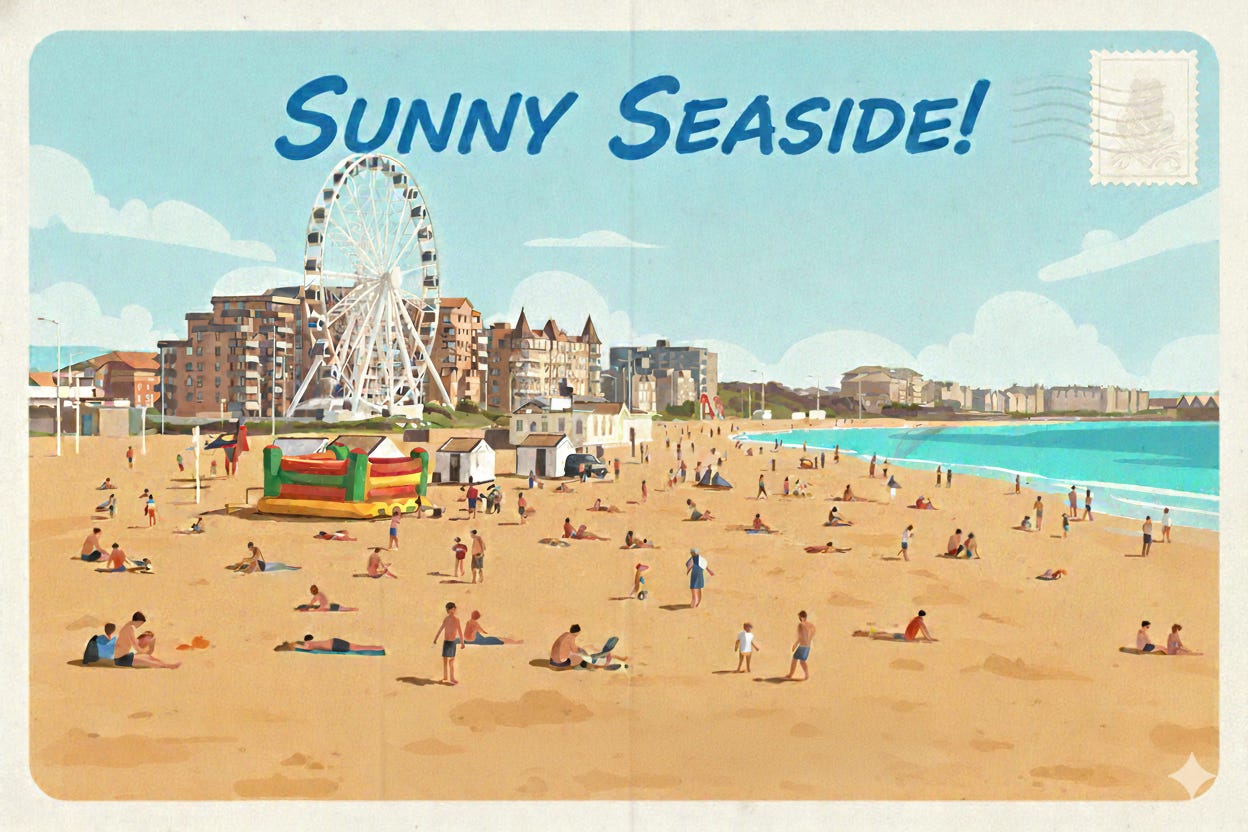Dear home,
I’m sorry I didn’t really get to speak with you whilst I visited recently. It was a hectic, whirlwind of a time, and I knew you’d understand. You’d probably forgotten the feeling of my feet anyway, and the few footprints I’d left on your sand had long since been erased by the tides. I thought I’d write instead, seeing as no sooner had you spotted me emerging from the train carriage than I was leaving again from your station platform.
You know, I rarely know what to say when I’m actually there beyond expressing my sheer frustration. Your buses haven’t become any more frequent—a minor miracle of stasis—and the cars are absolutely everywhere, clotting your veins. You feel, somehow, like a city that lacks the basic convenience of being one.
Have you thought about seeing someone about that existential crisis?
Still, at least the weather was good.
Perhaps you tried to make a tense and upsetting visit a little more bearable, so thanks for not raining on me like you normally do. A small, but appreciated, gesture of goodwill.
You know, it’s been over two decades now that you haven’t technically been my home, but I still reflexively refer to you as ‘home.’ That weird, clumsy way you use the word when someone asks where you’re from, and you don’t know what to respond anymore. I traded you for London, and although the capital doesn’t have its original sheen anymore, at least I feel a genuine sense of belonging here.
Home, home, home.
It’s a word with too many meanings when you don’t feel completely connected, but you kind of do at the very same time.
I ended up being a reluctant conductor for my cousin whilst we were there. He grew up elsewhere, and I grew instantly frustrated with his insistence on using the satnav, resorting instead to gesturing wildly at the windscreen like a frustrated orchestra director. I still know where I’m going.
I. Don’t. Need. Maps.
I felt that familiar, superior little rush of arrogance that comes with being difficult to confuse. Your streets weren’t my own anymore, but I still knew exactly where they were, and I knew their names by heart. The knowledge of a local never truly leaves you but makes you feel awesome when you can march around like the yesterdays.
Have you been well?
What’s new with you?
I tried to see if I could spot anything new, but it looks like precious little has changed. The same grey, flecked stonework still dominates the centre, and yet more housing estates are swallowing up the last scraps of greenery. It’s surprising you’d allow any more of it, really. You can’t get around the town as it is and your infrastructure long since stopped screaming in pain. Why bother screaming anymore? I think it’s dead, Jim.
I’d wanted to wander around some more and really take in what had changed, maybe find some unexpected place I once knew, or a cherished shop from my childhood that hadn’t closed its doors. It was warm enough to play on the pier actually, but I was immediately assured it was pointless. Apparently, you charge now just to go on it, and the beloved two-penny machines are mostly gone. You replaced them with a depressing collection of weirdly chosen rides. I miss your noisy, glorious chaos. The arcades, the sounds, the smell of chips and candyfloss on the seafront, and the bustle of the pier before you burned it down. I’d liked to have taken Peter to see that version of you. I don’t even have it on video.
Perhaps I’m just being hopelessly nostalgic. We’re both older, and I look back at the postcards and the pictures of your youth—the Victorian Age, your grand, expansive boulevards and winding backstreets full of sepia-hinted colours. Later the colour photographs from the ’70s, awash with perms, flags, and day-trippers.
Where have they gone?
I actually listened for the sound of the Welsh—they were always there on warm days, pouring off the coaches, but not even they were day-tripping this time. The silence felt strangely pointed, and a lot less Welsh.
Oh well. Perhaps we’re better off apart anyway.
I spotted a Reform poster when I was there. Someone had put it pride of place in their window, and I wondered how many people would put one up if they had one. I knew I’d see something like it, but to see it so deliberately positioned in someone’s lounge gave me the scent of puke. I could only imagine the stomach flips seeing more of them. What did those lot ever do for Weston?
Funny though. Like so often happens when I return, I was called ‘condescending,’ a term I absolutely loathe. It’s a word I only ever hear when I’m with you, and it always arrives in the same weary way.
‘It’s how you speak. You’re so condescending....’
I never realised how dependent on area that trait was. I’m never condescending in London—at least, I’m not told that I am—but apparently I’m always condescending in Weston. Somehow, I go past Swindon on the train and instantly switch from relative normality to utter obnoxiousness. I don’t think the problem is me, if I’m honest. I think it’s the location.
I think it’s you.
Anyway, I’m not entirely sure what this letter is for, but I wanted to let you know that I’m thankful for the sunshine, and that I think I probably won’t be back for a while, if ever. I used to daydream about finally moving home, but now I think I’m happy to visit you only via the telephone, saving my obnoxious condescension for ‘the London lot.’
Thanks for having me, and thanks for holding the fort.
Hayden



